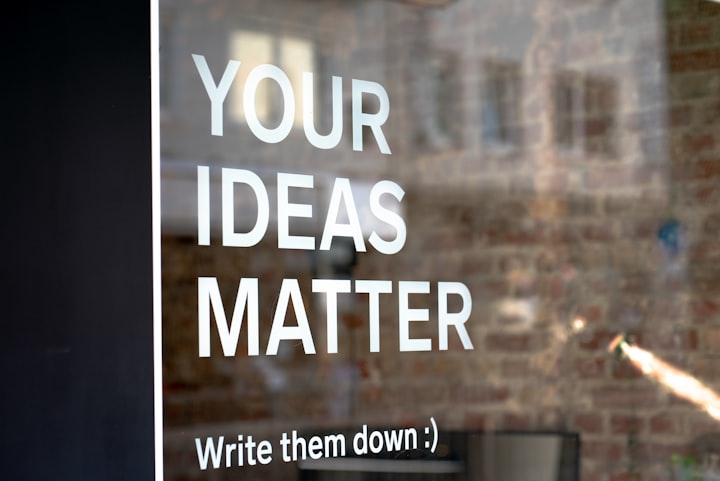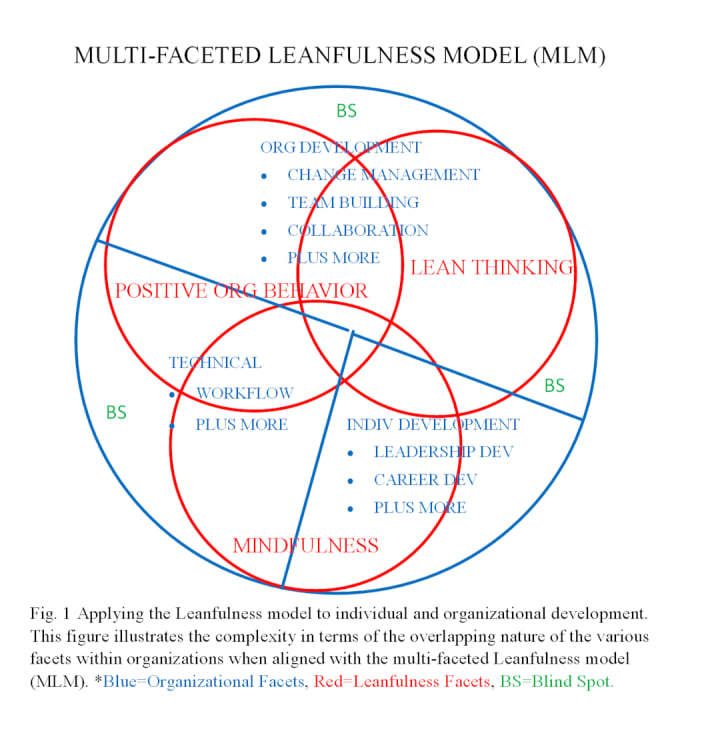A Positive Psychology Response to Change
Leanfulness

Introduction
The age of the Unthinkable. The world we once knew is going away. We are in the eye of the storm of change. The industrial age that we knew has been taken over by the information age. This story will present a novel idea developed to help how we respond to such a radical shift and choose to embrace change rather than hate change. The impact of this radical change is affecting every aspect of our lives. The way we connect and spend time as families has been altered. The way we communicate with our friends is less intimate. Our jobs have changed. We had to adapt to new tools and technology. These new tools are incrementally increasing our job scope. Consequently, we are required to learn new skill sets to keep up with the new technology and evolving job roles. The trajectory and future of the world we know is becoming more and more uncertain and unpredictable. What kind of world will our children and grandchildren experience? Are we destroying the world? Will technology destroy the human race? How should I attempt to make sense of all the change that is happening around me? These are some questions that many of us are asking.
How to create effective change that lasts
I founded Leanfulness Strategies in 2017 when I was living in Silicon Valley. I was midway through my doctoral studies to become an Organizational Psychologist and was completely frustrated with the prominent change management theories. They didn't seem to adequately account for each layer of complexity that exists in an open system such as human life systems. Change management specialists are trained to focus on the subject of change holistically, however I struggled to find an approach that was adequate, especially in such a rapid changing environment. It is no surprise that most change management initiatives fail in our personal and professional lives.
Either by accident or by fate I discovered a link between positive psychology, mindfulness, and lean thinking. The blending of these three schools of thought is now formally known as leanfulness. The leanfulness approach is used to provide an adequate accounting for the complexities involved in human life systems when managing change. When using leanfulness as the approach to respond to change needs the intention is to develop individuals and organizations to be increasingly equipped for effective change that is sustainable. I started using the leanfulness approach early on during my consulting as I saw any other approach as a set up for failure.
Finding clarity in uncertainty
As we try to make sense of our purpose and our identity in this seemingly new world, we have to think in terms as individuals and members of each function of society (i.e. occupations, religious groups, athletic organizations, political organizations, etc.). Even our spiritual identities are being radically challenged and changing. For such a time like this with so many facets of our existence being altered we are forced into situations that require continuous adapting. We are never finished. Our moments of feeling stable about anything are becoming shortened in duration. This enormous challenge of needing to constantly adapt the way we think, live, and work requires an adaptive system that can meet such a demand. I believe that the system I have been developing and teaching gives us a fighting chance to have more clarity as we maneuver through the murkiness of extreme uncertainty.
Why Leanfulness
Many organizations and individuals have varied success with managing change. However, most of us and our organizations suffer from the tendency of being too slow to identify problems and having inadequate systems to respond to change. Leanfulness provides us the multi-faceted psychological approach to respond to the multifaceted issues that exist in human life systems. Leanfulness was designed to help individuals and organizations improve their ability to timely identify problems, process the problem thoroughly, and achieve effective change that is sustainable and ready for change again.
The model below illustrates the Leanfulness Components

The Information Revolution (Digital Age)
As previously stated, our world is in the eye of the storm if you would. We are experiencing the winds of a radical transformation in every aspect of our lives as we shift from an industrial economy to an information or tech economy. The winds are turbulent at times. These strong winds have been felt for several decades now. If you are middle aged or older you have first hand experience as you witnessed and felt the introduction of new technological advancements begin to gain enormous momentum.
Similarly, the society who lived a century ago lived to experience the transition from the agrarian economy into the industrial economy. They endured and adapted to radical societal and technological change. The difference between the current transition to the transition a century ago is the pace of change. The pace of digital technology innovations far exceeds even the fastest period during the industrial age. Innovation at this speed is becoming harder to process as a society. Especially in the last decade. The rate of technology advancements is unfathomable. We really can’t wrap our minds around it. This pace of change is causing some to be terrified. On the other hand, many of us have a degree of trepidation but are excited and optimistic.

Even in the midst of the storm of change, I am excited beyond my imagination about the future of our society. Our kids are going to create awesome stuff. We middle-aged people and older are going to be fascinated and cynical at the same time as the life we knew is going away. Our human nature is to try to simplify things in our minds in order to feel a sense of control. This is the paradox we are all experiencing. The massive change in every aspect of our lives cannot be simplified. I don’t think that’s the right thing to do anyway.
What we need is a healthy vision to weather the storm while maintaining a sunny perspective as the gray clouds of uncertainty swirl around us. Do we really have a choice? Well I guess we do. We can choose to just hate life. We can choose to like it a little, or we can choose to embrace the change and get excited about it. With that said, the gray clouds of massive change are not why we feel anxiety, and fear anyway. We make the choice to feel anxious, or fear. Of course everybody wants as many things to be certain and predictable in their lives. Many of us wish our lives were like they used to be.
The p ace of innovation is like compound interest
Let's ponder this together, did we ever really have lives that were so predictable and certain. We begin life with predictable paths such as go to school, learn an occupation, be socially responsible, make families, and maybe leave a legacy behind. Sure, our lives were simpler for many of us. That is, without discussing the expected and unexpected challenges we all must endure. Let's put those aside as we ponder how simple life was. We always knew that the world we live in will be drastically changed and with it we will be changed. From the first automobile, to the first moon landing, to the first rover landing on Mars, we knew extraordinary change was inevitable and unthinkable. We really had no idea and still don't about what kind of change will be in the future.
The pace of change was much slower at the early stages of the industrial age and perpetually increased as one innovator built on ideas of another innovator and so on. It is a simple mathematical phenomenon called compounding interest. When we only posses a small amount of money the pace of earning compounding interest is slow. Conversely, the pace of compounding interest on large sums of money increases based on the size of the sum and the interest rates.
We are at a time where the pace of innovation is steadily and rapidly increasing as a result of the use of information or digital technology to solve complex problems. With the increase of complex problems being solved more complex problems are being realized. Therefore, the need for information technology surpassed the need for mechanical solutions that were developed to solve less complex problems. This is not to say that mechanical solutions are no longer needed. Even mechanical solutions are currently being designed with information technology creating a hybrid of mechanical/information solutions. You know the saying, "Necessity is the mother of invention." Where there was a need we found many mechanical ways to fulfill that need. As we collectively learned as a human race over time from previous inventions our capacity to invent has expanded and will continue to expand. That means, we haven't seen anything yet. What the future holds is unfathomable. The human mind is incredible especially when billions of minds are indirectly working together to identify needs, and solve them.
We choose what we get
We are all faced with a choice to how we respond to the changing world. I choose to not be scared and to accept the rapid pace of change as inevitable. Sure, we need some sense of control, right? Lets’ control what we can and let go of the uncontrollable. Like the trajectory of our world. This doesn’t mean to be irresponsible. Please let me be clear. I don’t suggest to just let stuff happen without being a voice. I think most of us that would take the time to read this far is because we are a voice or are compelled to be one. However, lets be a better voice. Lets be smart and calculated about political policies, be smart and calculated about values and ethics important to furthering justice, equality, freedom, etc. Lets be smart and calculated with finances and our economy. Let's also be responsible guests of this beautiful planet then someday the universe(s).
Fear hinders effective change
Many of us fear change or at least say they hate change if they don't admit they fear it. Let's not choose fear. When we worry excessively and jump to conclusions we give in to unfounded assumptions. For example, we can choose to assume that many technological advancements are causing behavioral changes that violate our societal morals or values. What are we basing that conclusion on? I ask this because we all do it. We all are subject to fear and anxiety in the face of change. Fear short circuits thinking. Fear doesn't feel good. So if it scares me I may stop there and conclude that it isn't good. That is the simple formula that guides us to many of our conclusions. Often we have little or no evidence beyond what we feel to support many of our conclusions. Another example, we have conflicting or very little evidence that social media is harming social norms or how we relate to each other. It isn't a secret however, as a result of social media many of us experience relating with our kids or even friends differently than we used to. It feels different. The feeling of it not being like it used to can be interpreted as not good. In a sense the not good feeling is absolutely valid for whomever it doesn't feel good to. That's a subjective feeling based on each person's preferences. Conversely, suggesting that because it doesn't feel good to someone or some people's preferences doesn't provide evidence that social media is harming relationships. Many other people prefer less personal contact and the opportunity to interact with people that they never would have prior to social media. The latter doesn't provide evidence that social media isn't harmful either. It's simply a preference. Maybe it is good maybe it is harmful. The jury is still out on that. We get to choose individually how we feel about social media. Consequently, how we choose to feel about social media will influence what we think about it or vice versa.
How we feel and what we think are highly interrelated. Don't get stuck on what happens first. It doesn't matter. You can choose to think positive or choose to feel positive and both will eventually align. I argue that social media has more pros than cons. That doesn't mean I believe that I am right. I simply came up with that conclusion anecdotally. It's my opinion. I choose to resist letting fear or thinking negative formulate what I believe. I prefer to choose positivity for most things. Therefore, if I think positive about something I will end up feeling positive. Not so easy all the time. We are human and other reasons for why we struggle are beyond the intention of this short story.
Leanfulness has given me the freedom from fear. It has helped myself and many of my clients discover that fear hindered much of our lives. Aside from fear are many other feelings that influence our conclusions. For example, we want to feel a sense of control (probably related to fear). We may come to a conclusion that feels right and just accept it because it fits with our values or ethics. Therefore it feels safe and we have that sense of control so we conclude that it is the right choice. For example, many believed and still do that homosexuals shouldn't be married. This belief was perpetuated through generations as fitting a set of values and simply because of that it had to be the right choice. Most of the opposed people made their own individual conclusions on that topic based on what they believed aligned with their values and didn't put a lot of effort to understand the many other layers of factors and other facets that go far beyond one person or groups value system.
We often take short cuts and allow a feeling or a singular focus to influence our conclusion or opinion about something without adequate vetting. Whether it's fear, disdain, anger, jealousy or any other singular focus by itself should not be accepted as adequate evidence to support one's conclusion. We can all relate to making a conclusion based on one of those feelings and knowing we came to that conclusion based solely on that feeling and we don't care. I believe most of the world's problems and conflicts are the result of what I call irresponsible and irrational conclusions. Instead, let us be responsible thinkers instead of living by feelings. Similarly in the context of change, rather than jumping to conclusions we can choose to resist short cutting the change process, and embrace all the nuances of the change as we process to the point to a well vetted conclusion. We get to choose how we think and feel about the change. We can also change how we thought and felt about the change. This may be one of the most robust psychological phenomena to change. Changing a persons mind is extremely difficult even when faced with evidence that on its face can't be denied however many will choose to deny it anyway.
We are faced with daily opportunities to hone our skill of processing our thoughts to the point of rational conclusions. We are good at jumping to irrational conclusions. That's easy. Jumping to an irrational conclusion is the product of a bad habit that we all learned. Fortunately we can look forward to many opportunities to break this habit. For this reason, change management is a complicated task that requires a great deal of knowledge about psychology, human behavior, systems thinking, and organizational development to support individuals and organizations toward successful and lasting outcomes.
Conclusion
I hope this introduction to leanfulness has began to stir some of your own thoughts about how you feel about change, how you respond to change, and how you reach conclusions. This is a good time to stop and reflect on what you are thinking. Consider your professional and personal journeys. Consider your organization and how you approach change. Think about a specific problem that requires change. Consider how you or your organization approaches assessing the current state, reflecting on past states, and considering desirable future states. Consider the difficulty of being certain the right decisions were made to create the future states you and or your team desired. Think about a specific change initiative that you experienced and consider were you and your team able to process all the moving parts thoroughly enough to ensure successful outcomes? Lastly, the goal of leanfulness is to help you and your teams feel confident about those questions above. For more information please go to www.leanfulness.org.
About the Creator
Christopher Boasso
I am the founder of Leanfulness Strategies. We serve our individual and organizational clients to improve the human part of business.






Comments
There are no comments for this story
Be the first to respond and start the conversation.